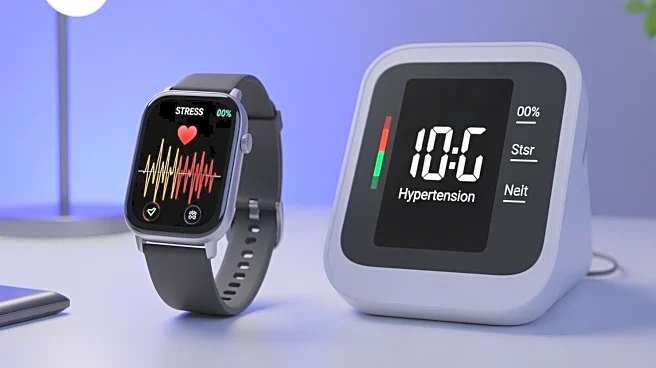What's Happening?
Oura is launching a redesigned app that includes expanded stress-tracking capabilities and new features aimed at detecting early signs of hypertension. The updated app will introduce a Cumulative Stress feature, providing users with a weekly overview
of how their body manages and recovers from sustained stress. This feature will utilize data from sleep, heart rate, temperature, and activity. The redesign, along with a new stress management dashboard, will be available on iOS and Android globally in the coming weeks. Additionally, Oura is collaborating with the FDA on a study to develop a feature that can identify early signs of hypertension. This study will be accessible to U.S. members of the Oura Labs early access platform in the coming months.
Why It's Important?
The introduction of these new features by Oura could significantly impact the health technology sector by providing users with more comprehensive tools for managing stress and monitoring blood pressure. The ability to detect early signs of hypertension could lead to earlier interventions and better health outcomes for users. This development also positions Oura as a competitive player in the wearable health tech market, potentially challenging other devices like the Apple Watch, which already offers hypertension notifications. The collaboration with the FDA underscores the importance of regulatory approval in bringing new health monitoring features to market.
What's Next?
As Oura rolls out these new features, the company may see increased interest from consumers seeking advanced health monitoring tools. The results of the FDA study could further validate the effectiveness of Oura's hypertension detection capabilities, potentially leading to broader adoption. Other wearable tech companies may respond by enhancing their own health monitoring features to remain competitive. Additionally, healthcare providers might begin to integrate data from devices like the Oura Ring into patient care plans, further bridging the gap between consumer technology and medical practice.
Beyond the Headlines
The expansion of stress and hypertension monitoring features in consumer wearables raises important questions about data privacy and the ethical use of health data. As these devices collect more sensitive information, companies like Oura must ensure robust data protection measures are in place. Furthermore, the reliance on wearable technology for health monitoring could lead to disparities in healthcare access, as not all individuals can afford such devices. This development highlights the need for ongoing discussions about the equitable distribution of health technology benefits.

















